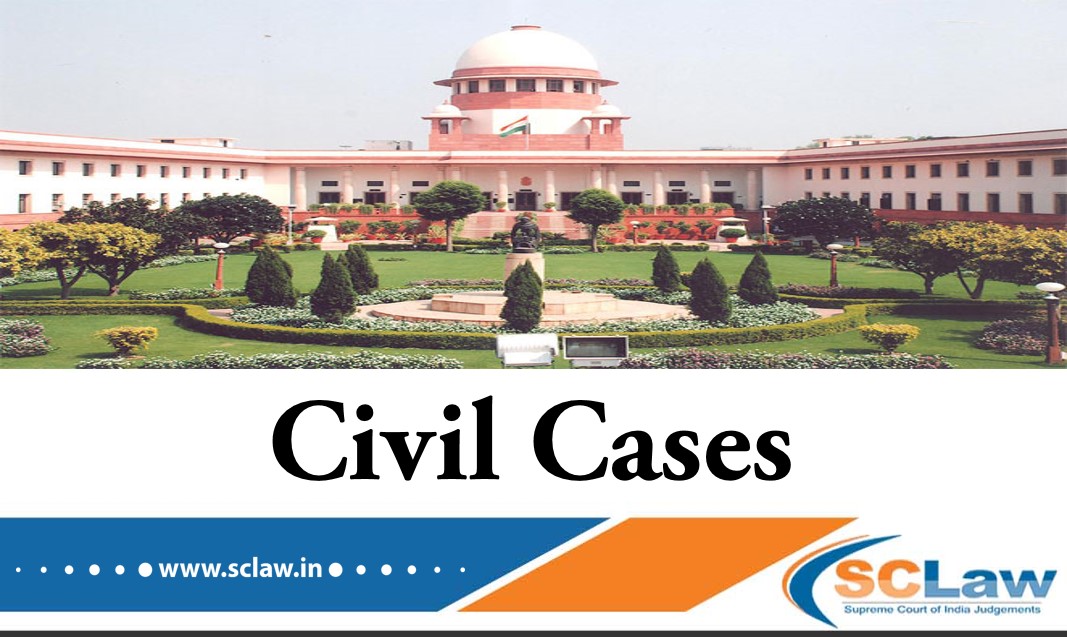Arbitration Law–Interest on award–Little confession in direction of arbitrator–It is presumed that arbitrator has granted simple interest @ 10% p.a. from date of decree till payment in full
2008(1) LAW HERALD (SC) 412 IN THE SUPREME COURT OF INDIA Before The Hon’ble Mr. Justice G.P. Mathur The Hon’ble Mr. Justice P. Sathasivam Appeal (civil) 12 of 2008 Ghulam…
IMP – FUTURE PROSPECTS- Future prospect to to be added on standardised percentage for Self employed, Fixed salary person even after the age of 50.
SUPREME COURT OF INDIA (Constitution Bench) Before :- Dipak Misra, CJI, A.K. Sikri, A.M. Khanwilkar, Dr. D.Y. Chandrachud and Ashok Bhushan, JJ. Special Leave Petition (Civil) No. 25590 of 2014.…
Transfer of Land–Granted land were intended for benefit and employment of original grantee and condition on original grantees restricting the transfer of same of a particular period.
2008(1) LAW HERALD (SC) 408 IN THE SUPREME COURT OF INDIA Before The Hon’ble Mr. Justice Dr. Arijit Pasayat The Hon’ble Mr. Justice P. Sathasivam Civil Appeal No. 7039 of…
Misconduct–Removal–Charge of issuance of forged licence–Misconduct of such a magnitude, when proved, cannot be ignored on surmises and conjectures–Equity in such a case would have no role to play.
2008(1) LAW HERALD (SC) 405 IN THE SUPREME COURT OF INDIA Before The Hon’ble Mr. Justice S.B. Sinha The Hon’ble Mr. Justice Harjit Singh Bedi Appeal (civil) 2322 of 2006…
Estoppel–Electricity Tariff–Levy of Surcharge–Doctrine of estoppel would apply in the case where the promise was made and it would not be applicable if no such promise was made. Tariff approved by the Commission cannot be changed by the Licensee–In case if the licensee(Corporation) violates the tariff so fixed, appropriate legal action can be taken against it.
2008(1) LAW HERALD (SC) 392 IN THE SUPREME COURT OF INDIA Before The Hon’ble Mr. Justice S.B. Sinha The Hon’ble Mr. Justice Harjit Singh Bedi Appeal (civil) 5789 of 2002 …
Surplus area–Utilisation of–High Court referred decision related to Maharashtra and U.P. to decided against appellant but recorded no finding to the effect whether Maharashtra and U.P. Statutes have any provision similar to Section 10A(b) of Punjab Security of Land Tenures Act, matter remitted to High Court to decide afresh.
2008(1) LAW HERALD (SC) 388 IN THE SUPREME COURT OF INDIA Before The Hon’ble Mr. Justice Dr. Arijit Pasayat The Hon’ble Mr. Justice P. Sathasivam Civil Appeal No. 1645-1647 of…
Bail–Pre-condition–Pre-condition to applying provisions of Section 439 of Code is that a person who is an accused must be in custody and his movements must have been restricted before he can move for bail.
2008(1) LAW HERALD (SC) 380 IN THE SUPREME COURT OF INDIA Before The Hon’ble Mr. Justice C.K. Thakker The Hon’ble Mr. Justice Altamas Kabir Appeal (civil) 84 of 2008 State…
Writ of mandamus can be granted only in case where there is statutory duty imposed upon officer concerned and there is a failure on part of officer to discharge the statutory obligations.
2008(1) LAW HERALD (SC) 373 IN THE SUPREME COURT OF INDIA Before The Hon’ble Mr. Justice G.P. Mathur The Hon’ble Mr. Justice Aftab Alam Appeal (civil) 82 of 2008 Oriental…
Forgery–Filling up of the blanks in cheque by itself would not amount to forgery. Cheating–Fraudulent or dishonest inducement on the part of accused must be at the inception and not at a subsequent stage.
2008(1) LAW HERALD (SC) 365 IN THE SUPREME COURT OF INDIA Before The Hon’ble Mr. Justice S.B. Sinha The Hon’ble Mr. Justice Harjit Singh Bedi Appeal (crl.) 62 of 2008 …
Medical Negligence–When a patient consults a medical practitioner, consent given for diagnostic surgery, cannot be construed as consent for performing additional or further surgical procedure – either as conservative treatment or as radical treatment – without the specific consent for such additional or further surgery.
2008(1) LAW HERALD (SC) 337 IN THE SUPREME COURT OF INDIA Before The Hon’ble Mr. Justice B. N. Agarwal The Hon’ble Mr. Justice P. P. Naolekar The Hon’ble Mr. Justice…
















